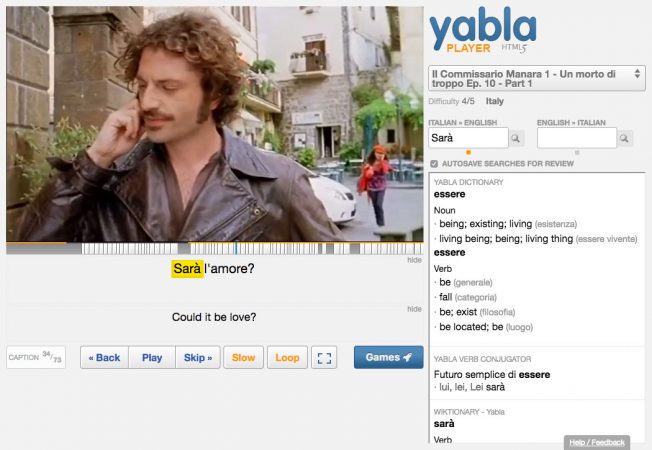Ciao a tutti!
Sarà.
What does it mean? Sarà?
Literally, sarà, as a future tense of essere (to be), means it will be.
But Italians often use the future tense to mean probably. And so it is in this scene from Il Commissario Manara on Yabla, when Luca’s sister asks him:
Sarà l’amore?
Could it be love?
Here are some more examples:
Che ore saranno?
What time must it be?
In base alla posizione del sole, saranno le undici.
Based on the position of the sun, it must be 11 O’clock.
Non vedo Giacomo da molto tempo. Dove sarà?
I haven’t seen Jim in a long time. Where could he be?
Sarà a casa.
He’s probably at home.
Of course, you don’t have to just use essere. The future tense of other verbs can serve the same purpose.
Dov’è Gina? Ieri è rimasta sveglia fino a tardi. Dormirà.
Where’s Gina? Yesterday she stayed up late. She’s probably sleeping.
Dove sono i ragazzi? Hanno un esame domani. Studieranno.
Where are the boys? They have a test tomorrow. They’re probably studying.
Me ne andrò presto dalla festa. Ho tanto da fare domani.
I’ll probably leave early from the party. I have a lot to do tomorrow.
But rather than complicate things, for now, just get that hang of using the future tense of essere to mean probability. How?
When you’re wondering what time it is, ask yourself out loud:
Che ore saranno?
Then answer yourself.
Saranno le due perché ho appena sentito il rintocco dell’orologio.
It must be two o’clock because I just heard the clock chime.
Or if the doorbell rings, ask yourself:
Chi sarà?
Who could it be?
Answer yourself.
Sarà il postino.
It’s probably the mailman.
How do you know when the future is the future and when it’s probability? Context of course! As you probably know by now, the Italian language relies heavily on context.
How many ways can you use essere to express a probability? How about avere? Post your answers to our Facebook page.
And that’s what to study this week. Alla prossima!
Yabla now has 11 full episodes of Il Commissario Manara. With Yabla you will have:
- verbatim subtitles in Italian
- access to English subtitles when you need them
- the ability to turn the subtitles off as you improve
And… this is especially useful… you can slow the video down! Yes! We all know how fast the Italians talk. You know a lot of the words. If you just had a little more time to process them…. Well, now you do!
If you feel your Italian is good enough to watch without Italian (or English) subtitles, this episode of Il Commissario Manara is also available for free from RAI. You will need to fast forward to exactly 48 minutes for the start of Un morto di troppo.




0 Comments